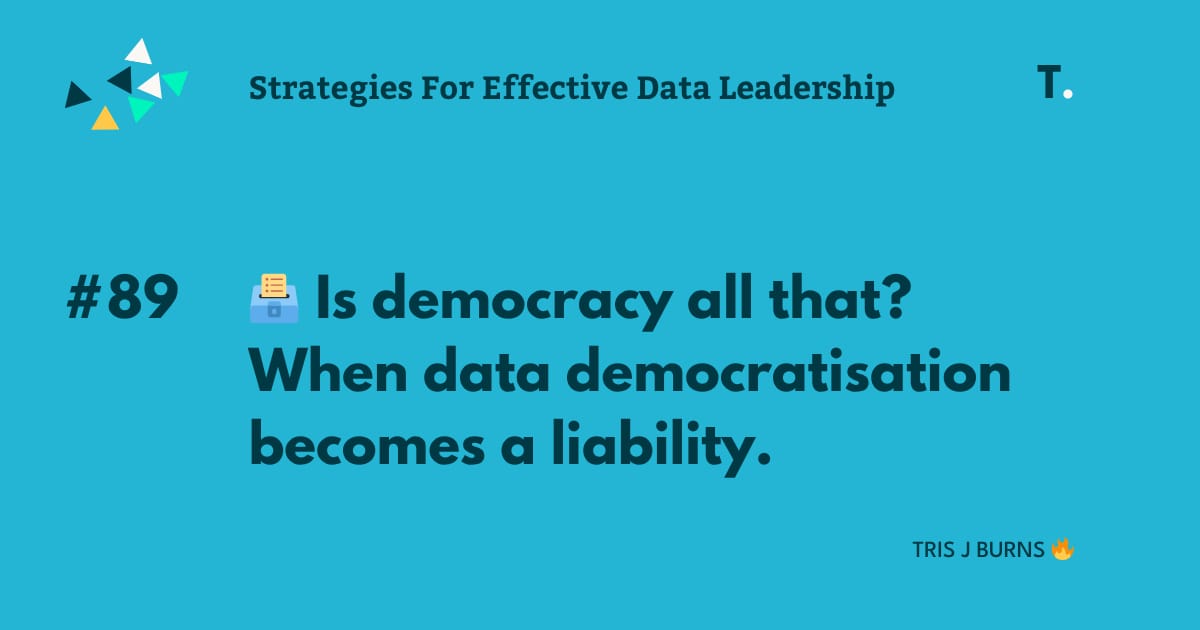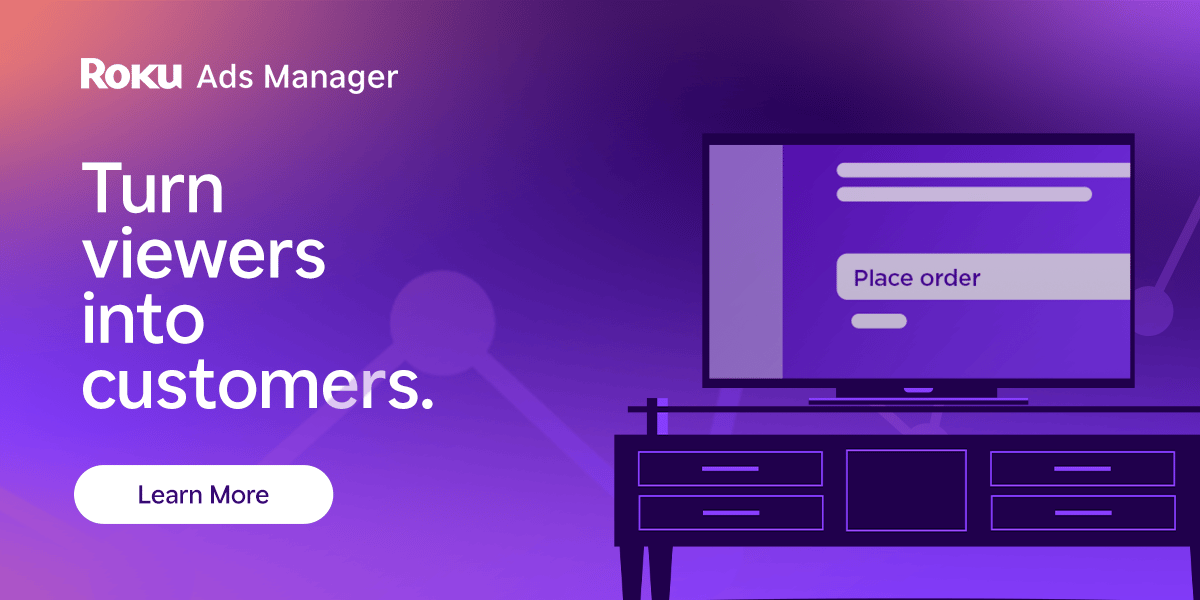
READ TIME: 5 MINUTES
Shoppers are adding to cart for the holidays
Over the next year, Roku predicts that 100% of the streaming audience will see ads. For growth marketers in 2026, CTV will remain an important “safe space” as AI creates widespread disruption in the search and social channels. Plus, easier access to self-serve CTV ad buying tools and targeting options will lead to a surge in locally-targeted streaming campaigns.
Read our guide to find out why growth marketers should make sure CTV is part of their 2026 media mix.
(🙏 checking out ads helps me keep this newsletter alive and free)
👨🏼💻 Is data democratisation a good thing?
Yes, of course it is.
Enabling the organisation access to its data should be the goal of every data team. Without the ability to check and interrogate data on their own, business stakeholders invariable come directly to data teams to have them provide it.
This positions the data team as a huge bottleneck and key dependency in helping the business get their hands on data.
When done right, democratisation builds trust, transparency, and speed of decision-making.
BUT (you knew there was a a big ‘but’ coming didn’t you?)
When done badly, data democratisation can fuel chaos, confusion, and political tension faster than you can say “single source of truth”.

“Wubba Lubba Dub Dub!” - wait wrong Rick…
Data leaders the world over see data democratisation as a key goal for their teams, whether they believe it is right or they’re being pushed aggressively by the business to achieve it.
In today’s edition we’re gonna dissect the concept of data democratisation, look at it’s potential shortfalls, and go from there to see what a success data democratisation approach might look like.
Buckle up!
🗳️ Poll time - don’t scroll any further (yet)!
How far along is your organisation when it comes to data democratisation?
(scroll to the bottom for last week’s poll results!)
😱 “My analysis is better than yours!”
Here’s what happens when the push for self-service goes wrong:
🤥 1. Conflicting truths start circulating
Without shared definitions, governance, and alignment on key metrics, you may end up with multiple versions of reality. Two people can look at the same dataset and walk into a meeting with entirely different numbers. Suddenly, your execs are arguing about which analysis is right rather than what the data means!!
🥊 2. The data team loses credibility
When stakeholders build their own reports and misinterpret the data, it quite often reflects poorly on the data team. You become the scapegoat for “bad data” even though the issue was misuse, not quality. This erodes trust and turns the data function into a convenient punching bag.
🫥 3. Strategic focus disappears
Instead of reducing workload, poorly executed democratisation can actually increase it. The data team spends more time fixing mistakes, clarifying definitions, and cleaning up after stakeholders who “went rogue”. Strategic projects stall because you’re too busy firefighting.
😖 4. Politics, not insight, drives decisions
Inconsistent data access creates power struggles. Certain teams or leaders start promoting “their” numbers that best support their narrative. Once politics take over, the data team’s ability to influence with objectivity plummets.
💔 5. You expose the cracks in business maturity
If the business isn’t ready either culturally or operationally for self-service, democratisation will simply expose weak data literacy, inconsistent decision-making, and a lack of accountability. It’s like giving everyone a Ferrari before they’ve passed their driving test.
The result the end up with is: More dashboards, fewer decisions, and a growing perception that the data team can’t deliver value.
👨🏻🔧 Here’s whatcha gotta do
Strong data leadership means knowing when not to give the business what it’s asking for. Democratisation is an earned capability. And earning it requires collaboration, governance, and maturity on both sides.
Here’s how to make that happen.
📏 1. Start with alignment, not access
Before anyone gets the keys to the data, align on the fundamentals: business logic, KPIs, metric definitions, and calculation methods (aka business logic). Every team must speak the same language before they start exploring the data. This is not a technical exercise; it’s a leadership exercise. Facilitate workshops where finance, marketing, and ops all agree on what “revenue,” “conversion,” or “churn” actually mean. (BTW I can help with this so hmu if you wanna chat)
👨🏼💻 2. Redefine the data team’s role
The best data leaders position their teams as enablers rather than gatekeepers. Your job is to coach the business to use data responsibly, not to guard it behind a wall. Build frameworks for quality assurance, version control, and metric ownership that make it easier for non-data folks to stay aligned without constant hand-holding.
🔋 3. Set guardrails that empower, not restrict
Self-service does not mean free-for-all. Implement sensible permissions, automated data quality checks, and clear sign-off processes for new metrics or dashboards. Guardrails protect both your data team’s reputation and the business’s confidence in what they see. You must remain in the loop.
🤝 4. Develop real collaboration rituals
Democratisation only works when the business and data teams are in regular, structured dialogue. That could mean a monthly “data council,” cross-functional working groups, or shared OKRs that tie data initiatives to business outcomes. These rituals turn alignment into a valuable habit.
✋🏼 5. Be brave enough to say “not yet”
This is where leadership and political capital come in. Sometimes, the smartest move is to slow things down. If your organisation doesn’t have the governance, literacy, or accountability in place, you’re better off delaying democratisation until the groundwork is solid. Saying no (or not yet) pure leadership!!
Data democratisation can transform how your business uses data. But without the right maturity, it’s like handing out matches in a fireworks factory.
Before opening the floodgates, build the trust, alignment, and collaboration your organisation needs to use data wisely.
🤝 Work with me in ‘25 (before price rise in ‘26!)
We’re approaching the business end of 2025. If you want to drive it home this year, this is pretty much your last chance to make an impact.
I have a few available spots for 1:1 data leadership coaching, but they won’t last long. Prices will increase in January so take advantage of 2025 pricing now.
If you’d like to explore working with me as your data leadership coach and smash what’s left of 2025 then now is the time to act.
Book a FREE 30 min intro consultation with me here.

Tristan Burns
⚡️ Previous poll results
Last week I asked you: What’s the hardest part of helping your data team communicate effectively with business stakeholders?
Over 50 of you voted and you responded with some very interesting split!

💡 Helpful resources for data professionals:
The Data Leadership Frameworks: This email series containing 10 data leadership frameworks, will equip you with the necessary skills and knowledge to maximise your effectiveness and become the influential and powerful data leader you know you can be.
DIY Coaching Program: Through a series of 9 self-guided exercises, you’ll clarify your goals, overcome obstacles, and create a plan for your next career move - all at your own pace.
⚡️Three more ways I can help you:
Private Coaching for Data Leaders: I work with data professionals looking to grow into influential and unstoppable data leaders to help them navigate and overcome the challenges of being a data leader.
Group coaching for Data Teams: Great data teams can make or break businesses. Through my facilitated 6-week group coaching program, together we get to the heart of what is holding teams back and set a course for data-driven success.
Google Analytics, Tagging and Looker Support: Helping teams to set up or optimising their data eco system, generate actionable insights and gain more in-depth knowledge through training.
What did you think of this email?
If you enjoyed this newsletter, why not forward it to a friend.
Did someone forward you this email? You can subscribe to Strategies for Effective Data Leaders here!


